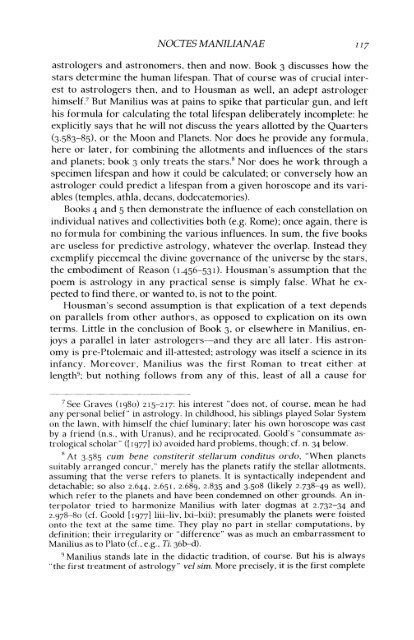MOUSEION - Memorial University of Newfoundland
MOUSEION - Memorial University of Newfoundland
MOUSEION - Memorial University of Newfoundland
Create successful ePaper yourself
Turn your PDF publications into a flip-book with our unique Google optimized e-Paper software.
NOcrES MANILIANAE 117<br />
astrologers and astronomers. then and now. Book 3 discusses how the<br />
stars determine the human lifespan. That <strong>of</strong> course was <strong>of</strong> crucial interest<br />
to astrologers then. and to Housman as well. an adept astrologer<br />
himself.? But Manilius was at pains to spike that particular gun. and left<br />
his formula for calculating the total lifespan deliberately incomplete: he<br />
explicitly says that he will not discuss the years allotted by the Quarters<br />
(3.583-85), or the Moon and Planets. Nor does he provide any formula.<br />
here or later. for combining the allotments and influences <strong>of</strong> the stars<br />
and planets; book 3 only treats the stars. 8 Nor does he work through a<br />
specimen lifespan and how it could be calculated; or conversely how an<br />
astrologer could predict a lifespan from a given horoscope and its variables<br />
(temples. athla. decans. dodecatemories).<br />
Books 4 and 5 then demonstrate the influence <strong>of</strong> each constellation on<br />
individual natives and collectivities both (e.g. Rome); once again. there is<br />
no formula for combining the various influences. In sum. the five books<br />
are useless for predictive astrology. whatever the overlap. Instead they<br />
exemplify piecemeal the divine governance <strong>of</strong> the universe by the stars.<br />
the embodiment <strong>of</strong> Reason (1.456-531). Housman's assumption that the<br />
poem is astrology in any practical sense is simply false. What he expected<br />
to find there. or wanted to, is not to the point.<br />
Housman's second assumption is that explication <strong>of</strong> a text depends<br />
on parallels from other authors. as opposed to explication on its own<br />
terms. Little in the conclusion <strong>of</strong> Book 3. or elsewhere in Manilius. enjoys<br />
a parallel in later astrologers-and they are all later. His astronomy<br />
is pre-Ptolemaic and ill-attested; astrology was itself a science in its<br />
infancy. Moreover, Manilius was the first Roman to treat either at<br />
length 9 ; but nothing follows from any <strong>of</strong> this. least <strong>of</strong> all a cause for<br />
7See Graves (1980) 215-217: his interest "does not. <strong>of</strong> course. mean he had<br />
any personal belief" in astrology. In childhood. his siblings played Solar System<br />
on the lawn. with himself the chief luminary; later his own horoscope was cast<br />
by a friend (n.s.. with Uranus), and he reciprocated. Goold's "consummate astrological<br />
scholar" ([1977] ix) avoided hard problems. though; d. n. 34 below.<br />
H At 3.585 cum bene constiterit steIJarum conditus ordo. "When planets<br />
suitably arranged concur." merely has the planets ratify the stellar allotments.<br />
assuming that the verse refers to planets. It is syntactically independent and<br />
detachable; so also 2.644, 2.651. 2.689. 2.835 and 3.508 (likely 2.738-49 as well).<br />
which refer to the planets and have been condemned on other grounds. An interpolator<br />
tried to harmonize Manilius with later dogmas at 2.732-34 and<br />
2.978-80 (d. Goold [1977]liii-liv. Ixi-Ixii); presumably the planets were foisted<br />
onto the text at the same time. They play no part in stellar computations. by<br />
definition; their irregularity or "difference" was as much an embarrassment to<br />
Manilius as to Plato (d.. e.g.. Ti. 36b-d).<br />
9 Manilius stands late in the didactic tradition. <strong>of</strong> coul'se. But his is always<br />
"the first treatment <strong>of</strong> astrology" vel sim. More precisely. it is the first complete

















